
Every time we go online, we leave a trail of information behind. This digital footprint can reveal more about us than we’d like to strangers and sometimes people with bad intentions.
Our blog post will guide you through how to safely navigate the digital world while minimising these traces for your peace of mind. Keep reading—it’s easier than you think!
Table of Contents
Understanding Digital Footprints

Understanding digital footprints is crucial in today’s online world. Digital footprints refer to the trail of data left behind by a person’s activities on the internet, including social media posts, online purchases, and website visits.
These footprints can be used to piece together information about an individual and pose various risks to their privacy and security.
What are Digital Footprints?
Every click, search, and share you make online contributes to your digital footprint. This is the trail of data you leave behind while using the internet. Your interactions with websites, social media posts, comments on forums, even filling out a form—all these create a digital record that often persists far beyond the moment of activity.
Your digital footprint includes everything from your browsing history to images tagged with your name—each piece building up a picture of who you are in the virtual world.
Such information can reveal insights into personal preferences, daily habits, and even confidential details like contact information or purchase history. For parents overseeing children’s online safety, office workers safeguarding sensitive documents, or just regular users mindful of their privacy—the message is clear: managing this digital trail is key to protecting one’s private life and maintaining internet security.
By putting smart practices into place now—like trimming down on unnecessary online exposure—you can take control over what parts of your life are accessible in the vast landscape of cyberspace.
The Dangers of Digital Footprints
The dangers of digital footprints include the risk of identity theft, invasion of privacy, cyberbullying, targeted advertisements, and reputation damage. These can have serious consequences for individuals in their personal and professional lives.
Risk of Identity Theft
Scammers can steal sensitive information from your digital footprint, putting your bank account, email, and other online accounts at risk. Protecting your digital identity is crucial to prevent the unauthorised use of personal data for criminal activities.
Taking proactive measures such as deleting old social media accounts and updating privacy settings can reduce the chances of identity theft. Regularly monitoring your digital footprint and minimising the information you share online are essential steps in safeguarding against identity theft.
Online privacy protection techniques like using alternate or anonymous accounts can also help minimise potential risks related to identity theft.
Cybercriminals exploit vulnerable personal information accessible through your digital footprint to carry out fraudulent activities like stealing someone’s financial details or creating a false persona under another person’s name.
Privacy Invasion
Protecting your digital footprint is crucial in preventing privacy invasion. Online activities, such as browsing history and social media interactions, can leave traces that have the potential to be exploited by cybercriminals.
Taking steps to minimise your digital presence, including limiting the information shared on public platforms and using privacy-focused search engines, can help safeguard your personal data from unauthorised access and misuse.
Implementing data protection measures like two-factor authentication and VPNs adds an extra layer of security to reduce the risk of privacy invasion.
Managing online reputation also plays a significant role in protecting against privacy invasion. Being mindful of the content you share and engaging with reputable websites can mitigate the likelihood of exposing sensitive information to prying eyes.
Cyberbullying
Cyberbullying can harm your digital footprint and online reputation. Bullies use social media, emails, or instant messaging to harass, threaten, or embarrass others. It’s important to respond thoughtfully and seek help from trusted adults if you experience cyberbullying.
Remember that taking legal action against the bully is possible in some cases. Being cautious about sharing personal information online can prevent bullies from targeting you.
To reduce the risk of cyberbullying, limit the amount of personal information shared on social media platforms and consider using strict privacy settings. Furthermore, parental monitoring software can help protect children from cyberbullies by limiting their exposure to harmful content online.
Targeted Advertisements
To manage digital footprints effectively, it’s important to recognise the impact of targeted advertisements. Advertisers use data from your online activities to tailor ads specifically for you.
This can lead to a feeling of constant surveillance and invasion of personal privacy, making it crucial to understand how this data is collected and used against your interests.
Scammers can exploit the information gathered from your digital footprint to create persuasive ads that could potentially lead to financial scams or identity theft. As such, being aware of the implications of targeted advertisements helps you take proactive steps to protect personal information and reduce exposure to such risks.
Reputation Damage
Reducing your digital footprint is crucial in preventing reputation damage. Scammers can exploit personal information from your online presence, potentially tarnishing your public image and professional standing.
Managing what you share online minimises the risk of negative consequences stemming from an undesirable virtual identity.
Protecting your digital footprint can be vital in safeguarding sensitive data and maintaining a positive reputation. Taking steps to limit the information accessible about you online helps mitigate potential risks and keep personal details secure.
How to Minimise Your Digital Footprint
To minimise your digital footprint, start by deleting old accounts and emails that you no longer use. Limit your social media presence and consider using alternate or anonymous accounts for online activities.
Be mindful of what you share and engage with online to reduce your digital footprint.
Delete Old Accounts and Emails
Deleting old accounts and emails is crucial in reducing your digital footprint. By doing so, you can minimise the data left behind and protect it from misuse by others. Unsubscribing from unnecessary email lists can also reduce the number of third parties with access to your information, thus enhancing your online privacy and security.
Scammers can steal sensitive information from your online footprint, putting your bank account, email, and other online accounts at risk. However, deleting old social media accounts and updating privacy settings are effective ways to reduce your digital footprint.
This proactive approach helps safeguard personal information from potential threats while minimising the risks associated with a larger digital presence.
Limit Social Media Presence
To further reduce your digital footprint, it is crucial to limit your social media presence. Regularly review and adjust privacy settings on social platforms to control who can view your information and posts.
Consider sharing personal updates with a close-knit circle rather than the public domain, as this can significantly minimise the data you leave behind. Additionally, refrain from oversharing sensitive information such as phone numbers or addresses on social media profiles to safeguard your online identity.
Evaluate the necessity of each platform and consider maintaining only those that serve a practical purpose in your personal or professional life. By reducing your overall presence across multiple platforms, you can diminish the likelihood of unauthorised access to personal data while still enjoying the benefits of staying connected with others online.
Use Alternate or Anonymous Accounts
To further reduce your digital footprint, consider using alternate or anonymous accounts for online activities. These accounts allow you to engage in social media, forums, or other platforms without revealing your true identity.
By doing so, you can protect your personal information and minimise the risk of identity theft or privacy invasion. Additionally, utilising such accounts limits the exposure of your online habits and preferences to third parties.
Creating alternate or anonymous accounts is a practical way to safeguard your digital identity while still participating in online interactions and activities. It provides an extra layer of protection against potential risks associated with sharing personal information on various platforms.
Be Mindful of Online Activities
Regularly assess your online activities to ensure that you’re not sharing personal information inadvertently. Limit the amount of personal data you share on social media platforms, and be cautious about what you post publicly.
Utilise privacy settings to control who can see your information, and think twice before clicking on links or providing sensitive details online.
Minimise the risks of potential cyber threats by being vigilant about your digital interactions, such as avoiding suspicious websites and emails. Take proactive steps to secure your digital footprint through simple actions like using strong, unique passwords for each account and enabling two-factor authentication where possible.
Tools and Techniques for Managing Digital Footprints

Utilise virtual private networks (VPNs) and two-factor authentication (2FA), opt for privacy-focused search engines and install browser extensions for blocking trackers to safeguard your online information.
Learn more about these tools and techniques by reading the full blog.
Virtual Private Networks (VPNs)
Using virtual private networks (VPNs) is a crucial step in safeguarding your online activity from potential threats. VPNs encrypt your internet connection, making it more difficult for hackers and other malicious entities to intercept your data.
By using a VPN, you can ensure that the information you send and receive over the internet remains secure and protected from unauthorised access.
When utilising a VPN, you are also able to conceal your actual location by connecting to servers in different geographic locations. This not only helps protect your privacy but also allows you to bypass region-based restrictions on certain websites or content.
Two-Factor Authentication (2FA)
Using two-factor authentication (2FA) adds an extra layer of security to your online accounts, making it harder for hackers to gain unauthorised access. By requiring a second form of verification, such as a unique code sent to your mobile device or email, 2FA significantly reduces the risk of identity theft and unauthorised account access.
Implementing 2FA can help safeguard sensitive information like bank details, personal emails, and social media accounts from potential breaches. It’s an effective way to protect your digital identity and reduce the likelihood of falling victim to online scams or cyber-attacks.
Enabling 2FA across various platforms enhances data protection online by minimising the chances of unauthorised entry into your accounts. This simple yet powerful security tool offers an additional barrier against potential threats while providing peace of mind regarding the safety and integrity of your personal information.
Privacy-Focused Search Engines
Privacy-focused search engines prioritise user privacy by not storing or tracking search history and activities. These search engines use advanced encryption methods to secure user data, ensuring that personal information remains protected during online searches.
By using privacy-focused search engines, individuals can minimise their digital footprint and reduce the risk of third-party access to their browsing habits, enhancing their online privacy.
These alternative search engines also offer additional features such as ad-free searching and the ability to bypass targeted advertisements, providing a safer and more secure browsing experience for users concerned about their online security.
Browser Extensions for Blocking Trackers
Minimising your digital footprint can be effectively achieved with browser extensions designed to block online trackers. These tools help safeguard your online privacy by preventing websites from collecting and tracking your personal data without consent.
By using these extensions, such as Privacy Badger and Ghostery, you can reduce the risk of targeted advertisements and minimise the amount of information third parties have access to about your online activities.
Implementing these browser extensions is a simple yet powerful way to take control of your digital footprint and protect your personal information while browsing the internet.
Taking proactive steps like installing tracker-blocking browser extensions can significantly enhance your online security, reducing the potential for identity theft or unauthorised use of your personal data.
Conclusion
In conclusion, safeguarding your digital footprint is vital for protecting personal information from misuse. Taking control of your online presence can reduce the risk of identity theft and privacy invasion.
Implementing measures such as limiting social media exposure and using secure online tools can help minimise potential risks. Managing your digital footprint actively contributes to maintaining a secure and positive online reputation.
It’s essential to be proactive in managing and protecting your digital identity for long-term security.
